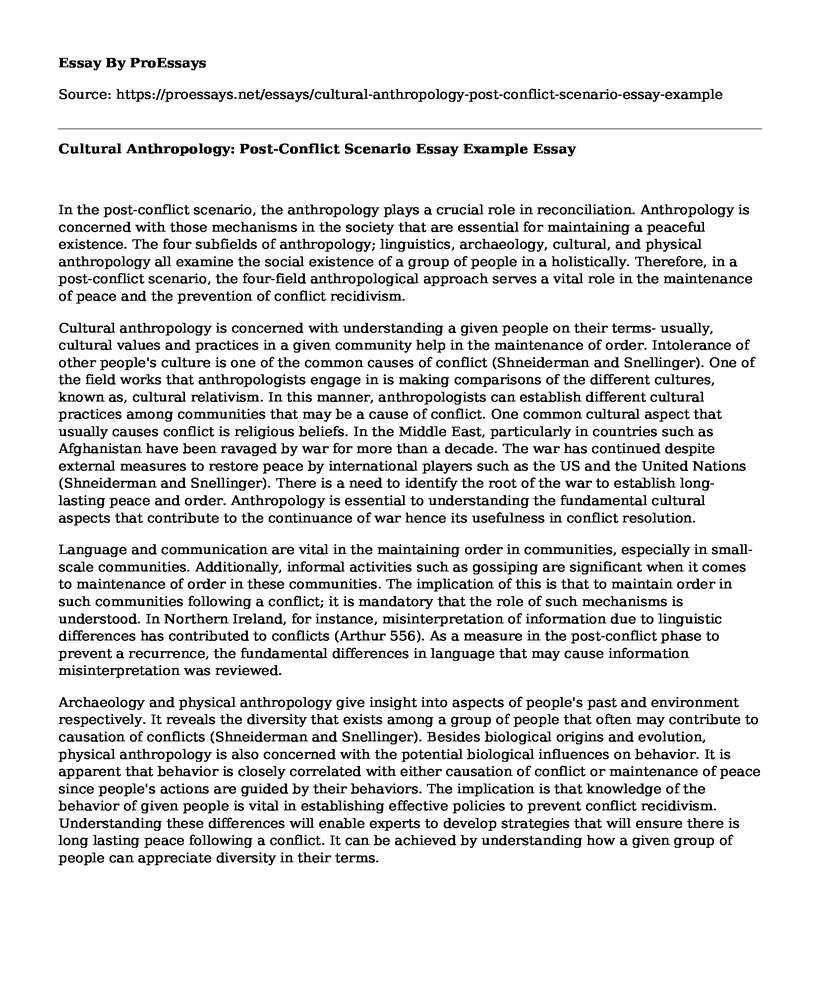In the post-conflict scenario, the anthropology plays a crucial role in reconciliation. Anthropology is concerned with those mechanisms in the society that are essential for maintaining a peaceful existence. The four subfields of anthropology; linguistics, archaeology, cultural, and physical anthropology all examine the social existence of a group of people in a holistically. Therefore, in a post-conflict scenario, the four-field anthropological approach serves a vital role in the maintenance of peace and the prevention of conflict recidivism.
Cultural anthropology is concerned with understanding a given people on their terms- usually, cultural values and practices in a given community help in the maintenance of order. Intolerance of other people's culture is one of the common causes of conflict (Shneiderman and Snellinger). One of the field works that anthropologists engage in is making comparisons of the different cultures, known as, cultural relativism. In this manner, anthropologists can establish different cultural practices among communities that may be a cause of conflict. One common cultural aspect that usually causes conflict is religious beliefs. In the Middle East, particularly in countries such as Afghanistan have been ravaged by war for more than a decade. The war has continued despite external measures to restore peace by international players such as the US and the United Nations (Shneiderman and Snellinger). There is a need to identify the root of the war to establish long-lasting peace and order. Anthropology is essential to understanding the fundamental cultural aspects that contribute to the continuance of war hence its usefulness in conflict resolution.
Language and communication are vital in the maintaining order in communities, especially in small-scale communities. Additionally, informal activities such as gossiping are significant when it comes to maintenance of order in these communities. The implication of this is that to maintain order in such communities following a conflict; it is mandatory that the role of such mechanisms is understood. In Northern Ireland, for instance, misinterpretation of information due to linguistic differences has contributed to conflicts (Arthur 556). As a measure in the post-conflict phase to prevent a recurrence, the fundamental differences in language that may cause information misinterpretation was reviewed.
Archaeology and physical anthropology give insight into aspects of people's past and environment respectively. It reveals the diversity that exists among a group of people that often may contribute to causation of conflicts (Shneiderman and Snellinger). Besides biological origins and evolution, physical anthropology is also concerned with the potential biological influences on behavior. It is apparent that behavior is closely correlated with either causation of conflict or maintenance of peace since people's actions are guided by their behaviors. The implication is that knowledge of the behavior of given people is vital in establishing effective policies to prevent conflict recidivism. Understanding these differences will enable experts to develop strategies that will ensure there is long lasting peace following a conflict. It can be achieved by understanding how a given group of people can appreciate diversity in their terms.
Conclusion
In summary, anthropology is essential for the maintenance of peace and order in a post-conflict scenario. In designing a normative approach to conflicts, international bodies need to consider the local psychological and cultural resources of given communities that aid them in coping with conflict. International bodies should engage these subjectivities in policy at an international level to serve post-conflict nations effectively. Therefore, anthropology serves the crucial role of making micro-studies on communities possible to enable peace-keeping efforts to be aware of the nature of outcomes the locals themselves desire.
Works Cited
Arthur, Paul. "The Anglo-Irish Agreement: Conflict Resolution or Conflict Regulation?" Bulletin of Peace Proposals, vol. 18, no. 4, 1987, pp. 555-565.
Shneiderman, Sara, and Amanda Snellinger. "Framing the issues: the politics of "post-conflict." Cultural Anthropology Online (2014).
Cite this page
Cultural Anthropology: Post-Conflict Scenario Essay Example. (2022, Oct 25). Retrieved from https://proessays.net/essays/cultural-anthropology-post-conflict-scenario-essay-example
If you are the original author of this essay and no longer wish to have it published on the ProEssays website, please click below to request its removal:
- Attending Workshops Essay
- The Ideal Society - Essay Sample
- Green Purchasing Behavior of Jeddah Millennials Paper Example
- Paper Example on Maximizing Employee Development for Improved Performance & Retention
- Culture: Impact on Communication & Interpersonal Skills - Essay Sample
- Essay Example on Friendship Conflict: Resolving Disputes Before Damage is Done
- Paper Example on Patients' Communication: Improving Quality of Care at Torin Regional Hospital







